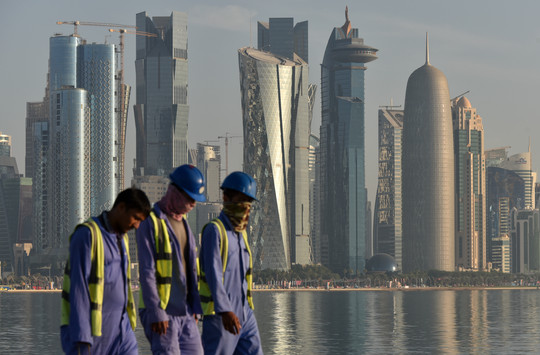Reports on the ground in Qatar, reveal continuous breaches of the new labour legislation by rogue employers emboldened by an absence of enforcement and growing confidence that rights violations will go unpunished. The threats, arrests, and sudden halt of meaningful cooperation with the Global Union Federations, such as the Building and Wood Workers’ International (BWI) and the International Domestic Workers Federation (IDWF) further confirm a deteriorating environment and reticence to build on progress achieved through dialogue and cooperation. Positive change has ceased not only because of the lack of political will or active opposition by many abusive employers, but also because of the lack of progress on International Labour Organisations’ (ILO) Fundamental Principles and Rights at Work, especially the refusal to permit the exercise of Freedom of Association.
As stated in the ILO’s Declaration of Philadelphia, “freedom of expression and of association are essential to sustained progress.” That was the approach of the ILO Governing Body during its consideration of a Commission of Inquiry on forced labour. The ILO Governing Body understood that a narrow focus on forced labour was not enough. They sought and received assurances from the Qatari Government on fundamental workers’ human rights. The November 2016 decision by the Governing Body, in closing the complaint, “recognized progress made by Qatar, and welcomed its commitment to ensuring fundamental principles and rights at work for all workers and the resulting breakthrough to end the kafala sponsorship system.” Fundamental rights were also an important part of the mandate of the ILO Technical Cooperation Office set up in Qatar. Continued progress and further improvements of labour rights is essential but, equally, it is imperative that the numerous structural and governmental obstacles are addressed if there is to be sustained change that leaves no worker behind.
Workers and their trade unions around the world are united in standing with migrant workers, consistently and coherently, in the firm conviction that no attempts to silence voices, through limited protections and precarious conditions, arrests, deportations, or attempts to purchase support will delay or weaken workers’ solidarity. Therefore, the undersigned Global Union Federations:
- Recall that freedom of association is an individual and collective right, guaranteed by international law, particularly the Universal Declaration of Human Rights and the International Covenant on Civil and Political Rights, which must be applicable for all workers regardless of country of origin and is essential for workers to be treated with dignity, fairness, equality, respect and independence ;
- Unequivocally support the struggle of migrant workers in Qatar for freedom of association and decent work with fundamental rights at work, social protection and social dialogue ;
- Call on the Government of Qatar to comply with the fundamental rights and principles at work, especially freedom of association, the right to organise, the right to collective bargaining and with the right to strike, as well as to ratify ILO Conventions 87 on Freedom of Association and Protection of the Right to Organise (1948) and 98 on the Right to Organise and Collective Bargaining (1949) without delay, as a basis to engage in good-faith and constructive negotiations with Global Unions ;
- Call on the Government of Qatar and on FIFA to recognise the exploitation and physical harm suffered by workers since 2010 and to use the FIFA World Cup Qatar 2022 Legacy Fund to provide remedy for the abuses of migrant workers and their families ;
- Support the creation of a Migrant Workers Centre that acts as an anchor point for migrant workers in their quest for education, assistance and justice ;
- Demand the ILO to conduct an independent review of the evolution of activities and developments affecting migrant workers, including the status of government efforts to meet their commitments on freedom of association and other human rights as well as reviewing the operations of its technical cooperation office in Qatar with special attention to its activities on fundamental rights at work ; and
- Encourage all parties to cooperate on a road map to achieve the protection of and respect for freedom of association and other human rights that will lead to stable, embedded and sustainable industrial relations and labour policies and practices.
Ambet Yuson
General Secretary - Building and Wood Workers International (BWI)
David Edwards
General Secretary - Education International (EI)
Atle Høie
General Secretary - IndustriAll
Anthony Bellanger
General Secretary - International Federation of Journalists (IFJ)
Sue Longley
General Secretary - International Union of Food, Agricultural, Hotel, Restaurant, Catering, Tobacco and Allied Workers’ Associations (IUF)
Rosa Pavanelli
General Secretary - Public Services International (PSI)
Benoît Machuel
General Secretary - International Arts and Entertainment Alliance (IAEA)
Christy Hoffman
General Secretary - UNI Global Union
Download here

